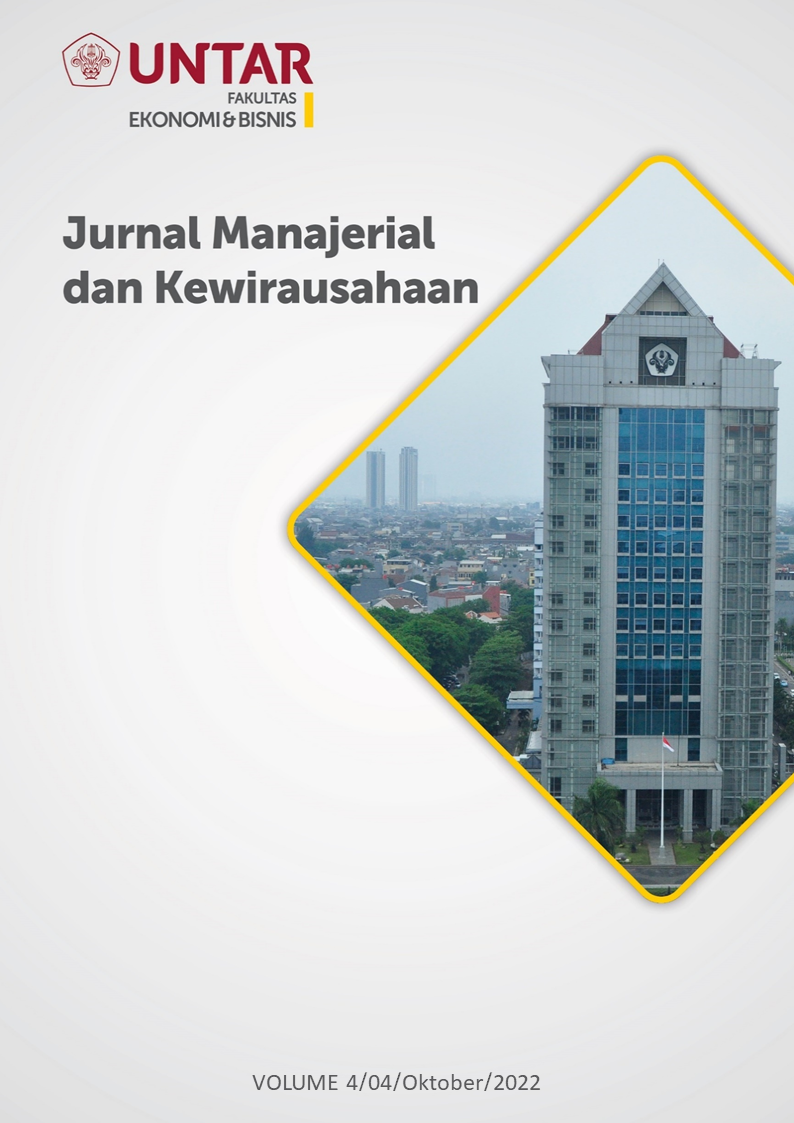Pengaruh Pendidikan Kewirausahaan, Pola Pikir Kewirausahaan, Kreativitas terhadap Intensi Berwirausaha
Main Article Content
Abstract
Perguruan tinggi memiliki peran dalam meningkatkan pengetahuan, keterampilan, pola pikir, serta sikap kewirausahaan pada mahasiswa yang pada akhirnya dapat menumbuhkan intensi berwirausaha mahasiswa. Perguruan tinggi bertanggung jawab dalam mendidik kemampuan berwirausaha terhadap mahasiswanya dan memberikan motivasi agar berani memilih berwirausaha sebagai karir. Tujuan penelitian ini adalah untuk mengetahui pengaruh pendidikan kewirausahaan, pola pikir kewirausahaan, dan kreativitas terhadap intensi berwirausaha pada mahasiswa Fakultas Ekonomi dan Bisnis Universitas Tarumanagara. Peneliti menyebarkan kuesioner kepada seluruh mahasiswa Fakultas Ekonomi dan Bisnis Universitas Tarumanagara dan berhasil mengumpulkan 200 responden dengan teknik pengambilan non probability sampling dengan convenience sampling. Dalam penelitian ini, data diolah menggunakan software Smart Partial Least Square (SmartPLS). Hasil penelitian ini menunjukkan bahwa pendidikan kewirausahaan, pola pikir kewirausahaan, dan kreativitas berpengaruh positif dan signifikan terhadap intensi berwirausaha pada mahasiswa Fakultas Ekonomi dan Bisnis Universitas Tarumanagara.
Universities have a role in increasing students' knowledge, skills, mindset, and entrepreneurial attitudes which in turn can foster student entrepreneurship intentions. Universities are responsible for educating their students on entrepreneurship skills and providing motivation to dare to choose entrepreneurship as a career. The purpose of this study was to determine the effect of entrepreneurial education, entrepreneurial mindset, and creativity on entrepreneurial intention on students of the Faculty of Economics and Business, Universitas Tarumanagara. The researcher distributed questionnaires to all students of the Faculty of Economics and Business, Universitas Tarumanagara and managed to collect 200 respondents using non probability sampling with convenience sampling as a sampling technique. In this study, the data was processed using the SmartPLS 3.3.3 Software. The results of this study indicate that entrepreneurial education, entrepreneurial mindset, and creativity have a positive and significant effect on entrepreneurial intention on students of the Faculty of Economics and Business, Universitas Tarumanagara.
Article Details
Section

This work is licensed under a Creative Commons Attribution-NonCommercial-ShareAlike 4.0 International License.
This work is licensed under a Jurnal Muara Ilmu Ekonomi dan Bisnis Creative Commons Attribution-ShareAlike 4.0 International License.,/p>
References
Arikunto, S. (2019). Prosedur Penelitian. Jakarta: Rineka Cipta.
Chandra, R. A., & Budiono, H. (2019). Pengaruh Pendidikan Kewirausahaan Terhadap Niat Berwirausaha Yang Dimediasi Efikasi Diri Mahasiswa Manajemen. Jurnal Manajerial dan Kewirausahaan, Volume I, 645-655.
Creswell, J. (2012). Educational. Research: Planning,. Conducting, and Evaluting. Quantitative and Qualitive. Researach 4th Edition.
BPS. (2021). Agustus 2021: Tingkat Pengangguran Terbuka (TPT) sebesar 6,49 persen. https://www.bps.go.id/pressrelease/2021/11/05/1816/agustus-2021--tingkat-pengangguran-terbuka--tpt--sebesar-6-49-persen.html.
Fatoki, O. (2014). The entrepreneurial intention of undergraduate students in South Africa: The influences of entrepreneurship education and previous work experience. Mediterranean Journal of Social Sciences. https://doi.org/10.5901/mjss.2014.v5n7p294
Ghozali, I. (2016). Aplikasi Analisis Multivariete Dengan Program IBM SPSS 23 (Edisi 8). Cetakan ke VIII. Semarang: Badan Penerbit Universitas Diponegoro.
Hair, J. F., Black, W. C., Babin, B. J., & Anderson, R. E. (2010). Multivariate data analysis. Pearson College Division.
Handayati, P., Wulandari, D., Soetjipto, B. E., Wibowo, A., & Narmaditya, B. S. (2020). Does entrepreneurship education promote vocational students’ entrepreneurial mindset? Heliyon, 6(11), e05426. https://doi.org/10.1016/j.heliyon.2020.e05426
Indahsari, L., & Puspitowati, I. (2021). Pengaruh Pendidikan Kewirausahaan dan Efikasi Diri Terhadap Intensi Wirausaha Mahasiswa Universitas. Jurnal Manajerial dan Kewirausahaan, Volume III, 267-276.
Indonesia, C. (2021). Jumlah Pengangguran di RI Capai 9,1 Juta Orang per Agustus 2021. https://www.cnnindonesia.com/ekonomi/20211105110036-532-717018/jumlah-pengangguran-di-ri-capai-91-juta-orang-per-agustus-2021.
Jiatong, W., Murad, M., Bajun, F., Tufail, M. S., Mirza, F., & Rafiq, M. (2021). Impact of entrepreneurial education, mindset, and creativity on entrepreneurial intention: Mediating role of entrepreneurial self-efficacy. Frontiers in Psychology, 12. https://doi.org/10.3389/fpsyg.2021.724440
Krueger, N. (1993). The Impact of Prior Entrepre-neurial Exposure on Perceptions of New Venture Feasibility and Desirability. Entrepre-neurial Theory Practice, 18(1): 5–21
Kumar, R., & Shukla, S. (2019). Creativity, proactive personality and entrepreneurial intentions: Examining the mediating role of entrepreneurial self-efficacy. Global Business Review, 097215091984439. https://doi.org/10.1177/0972150919844395
Kuratko, D. F., Fisher, G., & Audretsch, D. B. (2020). Unraveling the entrepreneurial mindset. Small Business Economics, 57(4), 1681-1691. https://doi.org/10.1007/s11187-020-00372-6
Laila, N., & Ngadi. (2008). Challenges of Unemployment in Indonesia . Jurnal Kependudukan Indonesia.
Moore, C. B., McIntyre, N. H., & Lanivich, S. E. (2019). ADHD-related Neurodiversity and the entrepreneurial mindset. Entrepreneurship Theory and Practice, 45(1), 64-91. https://doi.org/10.1177/1042258719890986
Nabi, N., et al. (2017). Impact of Motivation of Employee Performance: A Case Study Karmasangsthan Bank Limited, Bangladesh. Arabian Journal of Bussiness and Management 7(1).
Olejnik, S., & Algina, J. (2003). Generalized eta and omega squared statistics: Measures of effect size for some common research designs. Psychological Methods, 8(4), 434-447. https://doi.org/10.1037/1082-989x.8.4.434
Roscoe, J. T. (1975). Fundamental research statistics for the behavioral sciences. Holt, Rinehart and Winston.
Sandi, A., & Nurhayati, M. (2019). Effect of Entrepreneurship Education, Family Environment and Self-Efficacy on Students Entrepreneurship Intention. Advances in Economics, Business and Management Research, volume 120.
Sun, H., Lo, C. T., Liang, B., & Wong, Y. L. (2017). The impact of entrepreneurial education on entrepreneurial intention of engineering students in Hong Kong. Management Decision, 55(7), 1371-1393. https://doi.org/10.1108/md-06-2016-0392
Tessema Gerba, D. (2012). Impact of entrepreneurship education on entrepreneurial intentions of business and engineering students in Ethiopia. African Journal of Economic and Management Studies, 3(2), 258-277. https://doi.org/10.1108/20400701211265036
Wardana, L. W., Narmaditya, B. S., Wibowo, A., Mahendra, A. M., Wibowo, N. A., Harwida, G., & Rohman, A. N. (2020). The impact of entrepreneurship education and students' entrepreneurial mindset: The mediating role of attitude and self-efficacy. Heliyon, 6(9), e04922. https://doi.org/10.1016/j.heliyon.2020.e04922

